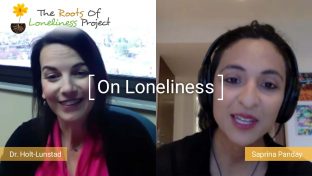What Is The Definition Of Loneliness And Is It An Emotion?

Loneliness is an adaptive emotional response that occurs when there is a discrepancy between the amount of social connection a person desires and the amount they actually have.
Key Takeaways:
- Loneliness is an emotion and is the (often unpleasant and sometimes painful) emotional response to the state of being lonely or alone
- Left untreated or ignored, loneliness can become chronic, having a detrimental effect on physical, mental, and emotional health over time
- Feelings of loneliness are subjective based on an individual’s response, situation, temperament, or disposition to being lonely
- Being lonely means that a person is alone, without companionship, and lacking meaningful connection with others
- Loneliness is the emotion caused by being lonely
Struggling with loneliness or having a mental health crisis?
- Suicide Prevention Lifeline: 1-800-273-TALK (8255); Deaf or hard of hearing dial 711 before the number or connect via online chat
As Dr. Julianne Holt-Lunstad explained to us in an exclusive interview, “loneliness is really the subjective feeling of being alone.”
The definition of loneliness differs from the state of “being lonely” — the former is a feeling or emotion while the latter is a condition or circumstance that can elicit emotion.
What Is Loneliness And Is It An Emotion?
Loneliness is the feeling or emotion associated with being alone or lonely.
As Dr. Julianne Holt-Lunstad explained, loneliness results from a “discrepancy between one’s actual level of social connection and one’s desired level of social connection.”
If an individual yearns for more connection with others and is not able to experience it, the disparity between what they’re getting and what they desire can result in loneliness — the subjective feeling of being alone.
You may be wondering, “Is loneliness an emotion?” The answer is yes.
Loneliness is a human condition and an emotion that lets a person know when they’re lacking a sense of meaningful connection with others.
Many people spend time alone or in solitude without experiencing feelings of loneliness as a result — and that’s perfectly normal.
If an individual isn’t craving more connection with others, the time spent alone doesn’t make them feel as though something is lacking in their lives.
On the other hand, when a person wants to be with people or foster deeper connections and is unable to do so, they can become lonely and experience feelings of loneliness.
Over time, loneliness can become chronic, potentially leading to health problems that can include high blood pressure and heart disease, a weakened immune system, stroke, and a higher risk for early mortality — among other things.
Loneliness Vs. Being Lonely
Loneliness is not quite the same as being lonely although the two are intimately entwined with one another; the first is an emotion, and the second is a state that can elicit an emotion.
As we talked about earlier, loneliness is an emotional response that occurs when a person desires more connection with others than they currently have.
This emotional response is adaptive and subjective — two people can experience loneliness in vastly different ways that are unique to them, due to their individual dispositions and temperaments.
To be lonely, however, is to be without companionship and/or lack meaningful connection with others.
It is a state of being — one that can (and often does) elicit an emotional response (loneliness) if a person desires more connection with others than they are currently receiving.
While “lonely” is not an emotion in and of itself, the state of being lonely can cause an emotional response.
Emotional Loneliness Vs. Loneliness As An Emotional Response
Although loneliness is an emotion — a response to the state of being lonely — it is not the same as emotional loneliness.
Emotional loneliness occurs when a person feels emotionally disconnected from those around them and is unable to make such connections with others.
Oftentimes, this type of loneliness is rooted in childhood neglect or trauma, resulting in emotional deprivation that leads to an inability to connect with others on an emotional level after reaching adulthood.
Further Reading And Resources On Loneliness
Through our continuing research and analysis over the past few years, we’ve discovered more than 100 types of loneliness, exploring each one in depth to create an extensive and ever-evolving directory.
Below, you’ll find our most comprehensive articles on loneliness, covering the types, causes, signs, and statistics, along with critical resources for those struggling with loneliness or mental health issues.
Key Resources On Loneliness:
- The Roots Of Loneliness Project: 100+ Types Of Loneliness & Counting
- Exploring The Human Condition Of Loneliness
- Loneliness Statistics: By Country, Demographics & More
- Signs Of Loneliness: What To Watch For (And When To Worry)
- Resources And Help For Crises, Mental Health, And Loneliness
Main Types Of Loneliness:
Videos On Loneliness:
- Loneliness Is Normal, But If Unchecked Can Damage Your Health
- The Origins & Culture Of Loneliness And Its Effects On Community
Closing Thoughts
As an emotional response, loneliness occurs when a person lacks connection with others and desires more than they’re able to receive.
To be lonely, however, is the state of being alone or lacking meaningful connection.
Loneliness — although it can cause feelings that are unpleasant at times — acts as a warning system that signals when a person’s social needs aren’t being met.
This is especially important if the signs and symptoms of loneliness have gone unrecognized.
Loneliness can happen to anyone — but there are plenty of resources for help and guidance if you know where to look.
Editor’s Note: This article is part of The Roots Of Loneliness Project, the first-of-its-kind resource that comprehensively explores the phenomenon of loneliness and over 100 types we might experience during our lives.
Find Help Now
If you’re struggling withloneliness, we’ve put together resources to meet you wherever you are — whether you want someone to talk to right now, or are looking for longer-term ways to help ease your loneliness.
- Suicide Prevention Lifeline: 1-800-273-TALK (8255); Deaf or hard of hearing dial 711 before the number or connect via online chat
- Resources & Emotional Support For Loneliness
- Volunteer & Pet Adoption Opportunities






